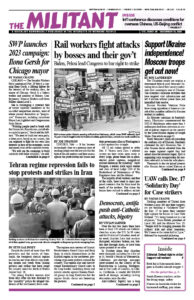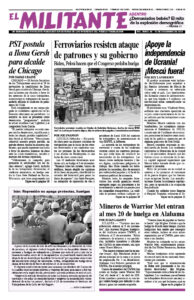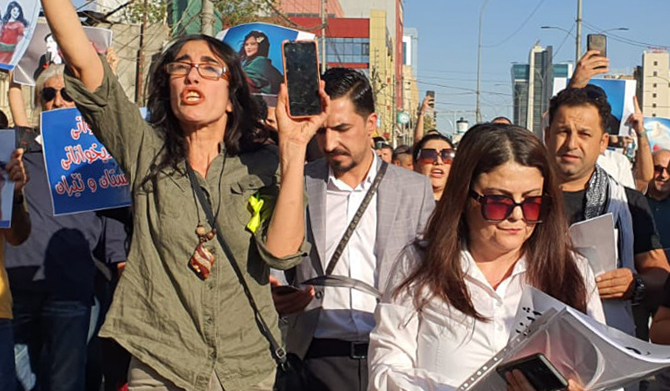SULAYMANIYAH — While browsing at the Pathfinder booth at the book fair, student Nwa Abdullah described a Sept. 28 demonstration here, above, in solidarity with protests in Iran, shortly after the killing of Jina Amini. The demonstration was attacked by riot police using tear gas, as was a demonstration in Erbil.
“Attacking a peaceful demonstration is not a sign of strength, but fear,” she said. “You have to ask, why do they fear us?”
Abdullah said she used to associate traditional Kurdish men’s clothes with “patriarchy.” But she was glad to see men dressed like that at the demonstration. “I’ve had to rethink my earlier reaction.”
A cement factory worker, Muhamad, talked about working conditions. He asked to use only his first name. “Conditions are getting worse,” he said, “especially wages. There’s too much inflation. Bosses don’t follow laws on safety.
“But the problem is the unions have shrunk. Older workers tell me they used to be stronger in the past. Today many function more like part of the Labor Ministry than real unions.”
At the offices of the Kurdistan United Workers Union, a couple of us met Bryar Azad Ibrahim, who went to the union for help in his fight for reinstatement after being sacked from his job at a cement depot.
“I was fired after a manager said I had called back a truck by mistake, even though he was the one who had told me to,” Ibrahim said. “I have a contract, and the procedure is that if you make a mistake, you first get a warning and then a fine before they can fire you.”
I told Ibrahim this sounded familiar. Bosses in the U.K. and elsewhere want to be able to fire workers without notice, and use temp agencies and contractors to get away with doing this “legally.” But workers can win jobs back, I added, especially when we organize and fight through our unions.


